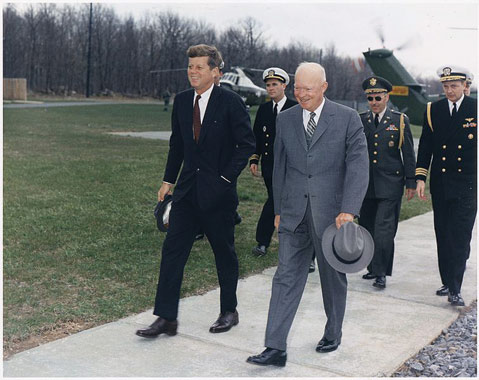I Confess: I Liked Ike
My, How Things Have Changed

I ADMIT IT: How things have changed. I voted for Republican Dwight D. Eisenhower for president. Twice. My parents did, too. They weren’t political people, there in Chicago, but they were Republicans fleeing the corn fields of Iowa and nurturing a hearty dislike of radical (ugh!) president Franklin Roosevelt. And for his successor, Harry Truman (double ugh!), whom they considered a low-caliber type from Missouri. Now both are considered among our best presidents. (What do parents know?)

All this, of course, was in the days when white people were running the show. “Colored people,” as they were known in South Side white circles, did not vote in anything like the kind of numbers we saw in the recent election — and, of course, hardly at all in the Old Confederacy. As for the other so-called minorities who helped reelect President Obama, Latinos and Asians, as well as gays, were hardly an electoral factor. Women voted as their husbands did, pretty much. No one marched for anything, except on St. Patrick’s Day, and certainly not for civil rights, whatever they were.
Abortion was not an issue anyone talked about. It was not only illegal but performed, as the expression went, only by “back-alley butchers.” If a girl “got in trouble,” she took a vacation with relatives out in the hinterlands. Blacks and whites lived in separate neighborhoods. Hollywood censored the movies, and the Catholic Church banned the books. “The pill” hadn’t been invented.
Dr. Gregory Pincus, encouraged by Margaret Sanger and Santa Barbaran Katherine McCormick, and working with a pharmaceutical company, invented the birth-control pill, which was okayed by the feds in 1960. Big pharm made zillions. Some years ago, I interviewed Pincus, who said he never made a dime from it.
Ah yes, those 1950s, a decade so many cherish as the good old days. A golf-playing, war-hero president. Eisenhower’s Democratic presidential opponent in 1952 and 1956 was an Ivy League intellectual named Adlai Stevenson, a former Illinois governor Republicans slammed as a professorial “egghead,” not a compliment.
While people joked about Eisenhower’s shaky syntax while speaking, Stevenson was eloquent. Not only was he balding and a Unitarian, whatever that was, but he was (ahem) divorced. A divorced man in the White House? (But by the time Ronald Reagan came along, not a word was said about his first wife. He was an actor, after all.) Stevenson was also a reluctant candidate, enlisted by Truman when all others failed the test. The electorate didn’t know what to make of him, and he didn’t have a chance.
The Cold War was blazing hot in the 1950s, with Senator Joseph McCarthy making wild accusations about Communists lurking all over the federal government. Reputations were ruined. Eisenhower refused to call McCarthy out. In Hollywood, directors, writers, and actors were blacklisted.
Uncle Sam called me from college for Army duty. Eisenhower had presided over not only the Allied Forces in Europe during WWII but also the end of the Korean Conflict; there was now no shooting war. No one thought of escaping to Canada. The economy was booming, suburbs were mushrooming, and (almost) everyone was happy.
But down in Montgomery, Alabama, a young Baptist preacher was being very un-1950s-ish. On December 20, 1956, a seamstress named Rosa Parks refused to leave her bus seat so a white man could sit down. She was arrested, sparking not only a successful bus boycott led by Reverend Martin Luther King Jr. and others but also a sweeping civil rights crusade that changed America. Segregation was at last being challenged.
At the time, I was a personnel specialist at Fort Kobbe, Panama Canal Zone. In 1960, Stevenson, after being whipped twice, amazingly sought the Democratic presidential nomination a third time. But a young new star had ascended: John Fitzgerald Kennedy swept into the presidency, inspiring the nation with promises of a “New Frontier.” Swept up in the fervor, I became a JFK Democrat, and he got my vote over Richard Nixon. When Kennedy was assassinated in Dallas on November 22, 1963, another date that will live in infamy, I truly felt that the world would never, could never, be the same. In a way, I was right.
My children and I gathered around the TV to watch JFK’s funeral, to the beat of those heartbreaking muffled drums. The brief, idealistic Kennedy years were over, along with the 1950s, so unrealistically golden to so many, but so tarnished in the rear-view mirror.



